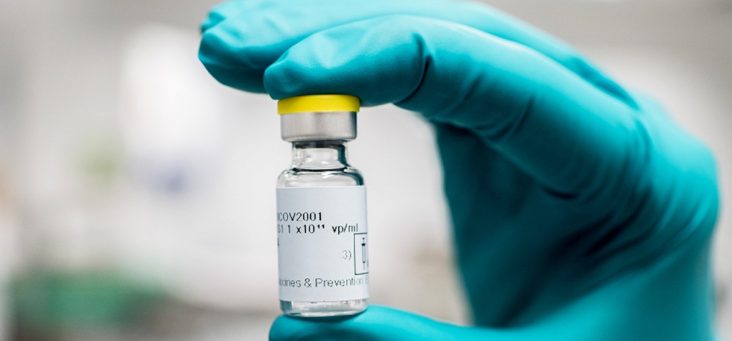Gov. Hutchinson: J&J pause no reason to delay getting a vaccine; state in a race against next surge
by April 13, 2021 3:35 pm 595 views

A pause in the distribution of the Johnson & Johnson COVID-19 vaccine is no reason to not get a vaccine, Gov. Asa Hutchinson said Tuesday (April 13), adding that the state is in a race to avoid another surge in COVID cases like that ongoing in Michigan.
The U.S. Centers for Disease Control and Prevention and the U.S. Food & Drug Administration on Tuesday called for a halt to using the Johnson & Johnson (Janssen) vaccine because six people reported a serious blood clot issue a few weeks after receiving the vaccine. More than 6.85 million of the J&J vaccines have been administered. None of the six cases were in Arkansas.
“In these cases, a type of blood clot called cerebral venous sinus thrombosis (CVST) was seen in combination with low levels of blood platelets (thrombocytopenia). All six cases occurred among women between the ages of 18 and 48, and symptoms occurred 6 to 13 days after vaccination,” noted part of the CDC statement. “People who have received the J&J vaccine who develop severe headache, abdominal pain, leg pain, or shortness of breath within three weeks after vaccination should contact their health care provider.”
Dr. Anthony Fauci, director of the National Institute of Allergy and Infectious Diseases, and Arkansas Secretary of Health Dr. Jose Romero stressed that adverse reactions are “very rare” and the pause should show people how the system is focused on safety.
“We have a system in this country that is very robust for identifying these adverse events,” said Romero, who is also chair of the CDC Advisory Committee on Immunization Practices, which will meet Wednesday to discuss the investigation of the six cases.
Prior to Tuesday, three vaccines were being administered in the U.S., with the J&J being the only one-shot dose. The Moderna and Pfizer vaccines require two doses.
But the pause is not likely to help state and federal efforts to overcome resistance to getting the vaccine. Arkansas Foundation for Medical Care CEO Ray Hanley noted in a recent interview with Talk Business & Politics that 50% of Republican men don’t plan to get vaccinated, while 90% of Democratic men said they would. White evangelicals are also less likely to want to get vaccinated, according to the survey Hanley cited. He also said Blacks and Hispanics are also reluctant. Arkansas has fully vaccinated 18.3% of its population, according to a recent New York Times COVID-19 vaccine tracker. That’s only better than three other Southern states – Alabama, Georgia, and Tennessee – which are among the least successful states in the country for COVID-19 vaccine rates.
‘MESSAGING CHALLENGE.’ MICHIGAN TREND
Gov. Hutchinson acknowledged during his weekly COVID-19 briefing on Tuesday that the J&J pause does not help alleviate vaccine hesitancy that existed prior to the pause.
“It’s going to be a little bit more of a messaging challenge. We’ve got to rebuild any lack of confidence as a result of this pause. We want to emphasize that you’ve got two vaccines that are not impacted by this that are available,” he said, adding that the White House will have to help the states with national messaging.
He also said the state will “backfill” scheduled clinics planning to use the J&J vaccines with Moderna and Pfizer vaccines, and stressed that the pause should not slow vaccine distribution. As of Tuesday, the state had 245,000 Pfizer vaccines in inventory, 178,000 Moderna, and 63,000 J&J.
“No one should delay getting the vaccination because of the pause on one part of the vaccination. We have the supply currently on hand in Arkansas to meet the demand needs of our state,” Gov. Hutchinson said.
Part of the urgency is to avoid another surge in cases, Gov. Hutchinson said. Using Michigan as an example, he said Arkansas is about 32 days behind the case trends in Michigan and other more populated states. Michigan is reporting thousands of new COVID cases daily when just a few weeks ago the numbers were trending below 600 a day. In many parts of the state, hospitals have halted elective surgeries and other procedures in order to redirect resources to COVID care. Michigan officials say two primary factors behind the surge is the more transmissible UK variant and people and businesses easing up on health safety guidelines too soon.
“We need everyone to participate in this. Don’t delay, because we are in a race. We are in a race against time to get the vaccinations out before we start going up in our cases again. At least that’s the trend line we’ve seen in other states,” Gov. Hutchinson said.
Arkansas’ previous surge peaked in January with a record 4,304 new cases reported on Jan. 1, a record 27,822 active cases posted Jan. 9, and a record 1,371 hospitalizations reported on Jan. 11.
COVID REPORT – April 13
New known COVID-19 cases, active cases, tests
• Total confirmed and probable cases: 332,446, up 224
• Total confirmed and probable active cases: 1,663, up 23
• Total confirmed and probable deaths: 5,673, up 8
Hospitalizations
148, down 8
Ventilators
19, up 2
As of Tuesday at 3:30 p.m., there were 31,311,046 U.S. cases and 563,027 deaths. Globally, there were 137,034,945 cases and 2,951,331 deaths.
